Skuld would like to remind Members that as of 1 January 2018 EU Regulation 2015/757 became fully effective, this regulation is also known as the Monitoring, Reporting and Verifying Regulation ("MRV Regulation").
The principle behind the MRV Regulation is to monitor, report and verify Co2 emissions from maritime transport and is part of wider EU initiatives to better understand and reduce greenhouse emissions from shipping.
Applicability
In short the MRV Regulation applies to all vessels, greater than 5000 GT, conducting commercial voyages into or out of, or in-between EU and EFTA (Norway and Iceland) Ports of Call. A Port of Call is a place where a vessel loads or unloads her cargo or embarks or disembarks passengers. i.e. vessels arriving, departing or sailing between ports within EU / EFTA to load / unload or embark / disembark passengers. Such a voyage will be known as a Reportable Voyage.
There are some exceptions as to vessel types, including warships, auxiliaries, fishing and fish processing (generally non-commercial voyages). It should be noted that the MRV Regulation applies irrespective of flag and it is an interesting feature that this piece of EU legislation is in a sense international in nature. This is because Reportable Voyages may well start outside of the EU. So, for example, a Hong Kong registered vessel loading containers in Singapore to discharge in Southampton would be captured under the Regulations.
What does the MRV Regulation require shipowners to do?
Essentially the aim of the MRV Regulation is to allow the EU to better understand Co2 emissions and fuel consumption in the shipping industry, or put in a broad sense, understand, the impact shipping has upon the environment. To do this, shipowners, meeting the requirements set out above must:
Monitor
Each vessel must have a monitoring plan to monitor Co2 emissions and fuel consumption as well as other relevant information to assist the EU. This other information includes, distance travelled, time spent at sea, and the type and amount of cargo carried. Measurements of fuel consumption shall be done by the use of bunker delivery notes, periodic bunker stocktaking, flow meters and measuring actual Co2 emissions.
It should be noted that monitoring is also required for vessels manoeuvring within port and when alongside.
Report
The second step is to report that which has been monitored. Please note that there are requirements to report not only on a 'per voyage' basis but also on an annual basis. The annual report consists of the aggregated totals of emissions and other required measurements for all voyages which fall within the scope of the regulation.
Verification
Once the data is collected and reported, it must then be verified. Such verification must only be done by third party accredited verifiers. Typically we are seeing classification societies who have been given the accreditation.
The role of the accreditor is to ensure that both the monitoring plan and emissions report are in accordance with the requirements of the MRV Regulation.
Once the reports are verified they will then be submitted to the EU THETIS MRV platform.
The EU then plans to publish the data it has collected through the monitoring and reporting by June 2019 and annually thereafter.
Compulsory
It should be noted that MRV Regulation is compulsory, although it will be down to Member states to implement within their own domestic legislation how compliance is enforced.
The IMO
Like buses, two schemes have come along more or less at the same time. The IMO has also introduced a similar scheme to that of the EU when it adopted a "Data Collection Scheme" in October 2016 to commence in 2019. Given that the vessel applicability is the same as under the EU scheme, the IMO version will additionally capture those vessels which would not fall under the EU version, i.e. those vessels / voyages that do not touch the EU /EFTA. Whilst exact details are being finalised, it looks like both schemes will be similar and we assume run alongside each other, at least for an initial period.
Comments
This regulation will have an important impact upon future initiatives to make shipping greener and better for the environment. Collecting data in this way should hopefully ensure that future 'green' initiatives are proportionate and appropriate, based upon proper analysis and in a transparent manner.
Photo: Funnel (Source: BGribnau/Shutterstock.com)
